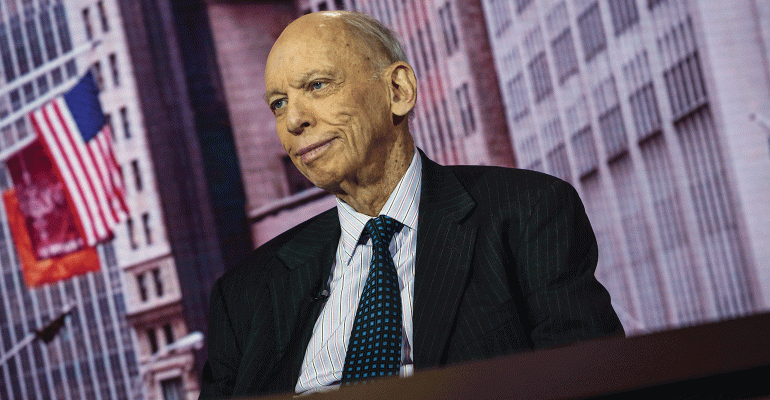Some investment experts say the stock market’s post-election rally is overdone. Wall Street éminence grise Byron Wien, vice chairman of multi-asset investments at private equity titan Blackstone, disagrees.
He figures that President Trump will be able to implement about half his program of deregulation, tax cuts and infrastructure spending. That should be enough to push the S&P 500 index to 2,500 this year, up 5.4 percent from its March 13 close of 2,373, says Wien, who spent 21 years as a top investment strategist at Morgan Stanley and is known for his annual list of ten surprise predictions for the market.
He also believes the current trend toward passive investment management will reverse, as financial markets begin to move in a less correlated manner.
Wien recently spoke to Wealth Management about what has changed in the investment business over the last 50 years, how it might change further in the future and how much he still believes in his 2017 predictions.
Wealth Management: The stock market has been on a tear so far this year. Do you think it will last?
Byron Wein: If President Trump is able to implement his pro-growth program of tax cuts, deregulation and infrastructure spending, growth could increase from 2 to 3 percent and there would be a more sustainable trend in earnings in more sectors. That would make it easier for active money managers.
The question is how much of his program will he be able to implement. I figure he’ll get half of it implemented and that will be enough for the market to do well. I have a target of 2,500 for the S&P 500 sometime this year.
WM: What are some of the most interesting developments in the investment business since you entered it?
BW: In 1965, there was no algorithm trading and that accentuates trends in either direction. The market is more volatile now, though not as much in the last few months; that volatility makes investing more difficult. Long only funds and hedge funds have had difficulty outperforming.
In the heyday of equity investing, 1982-1999, it was easy to beat the market. Since the recovery began in 2009, it has been very hard to beat the market. There have been very few trends with long staying power and volatility is greater.
This has been a liquidity driven market caused by Fed easing. Multiples have expanded more than earnings expanded. S&P 500 earnings have been caught in a trading range for the last four years. The stocks that have performed are in a very narrow band — mostly social media stocks. FANG — Facebook, Apple, Netflix and Google — have dominated the market. If you own them it has been a good experience, but if you own most other things it hasn’t.
WM: What kind of changes do you expect in the future?
BW: Investors will have to search for valuation anomalies. Some sectors will be ignored for periods then come into bloom. I don’t think the business was ever easy, but the trend toward passive investing is being overdone, and I think active investing will pay off better in the future.
The market will be less correlated. This period I think, and hope, is an aberration. Global central bank easing has contributed to the correlation and people are frustrated with active management. People have chosen passive management out of default. When active starts to deliver performance, investors will come back to it.
WM: Which investors among your contemporaries, and those who have come afterward, do you admire most?
BW: Few people can deliver consistent performance over a long period of time; they do it for different reasons. Jim Simons [founder of hedge fund management firm Renaissance Technologies] is the master of quantitative money management, using mathematical tools to outperform the market. He understands the historical behavior of stock sectors, and when there’s an aberrant deviation, he trades it. His analysts don’t know what companies do, they just know the symbol and market behavior.
David Tepper [founder of hedge fund firm Appaloosa Management] is probably the best stock picker. He’s very thorough in his analysis and very flexible. He stays with something as long as it makes sense, but he doesn’t overstay an idea. He’s a value investor who has deeper and faster analysis than others.
The best growth investor is Joe McNay [founder of Essex Investment Management]. He understands the factors that determine sustainable growth. Seth Klarman [co-founder of hedge fund manager Baupost Group] is probably the best macro thinker or factor evaluator. He has the best understanding of macro and microeconomic factors and how they influence the credit markets.
I purposely left out Warren Buffett and George Soros, two of the greatest investors, because they are on everyone’s list.
WM: Of your top 10 surprise forecasts for this year, which predictions do you feel best about?
BW: I feel pretty good about all of them. The one that looks worst stipulated is “Donald Trump moves away from his more extreme positions on virtually all issues to the dismay of some right-wing loyalists. … He vows to win over those who oppose him by 2020.”
I still think I’ll be right [about predicting increased growth for the economy and higher interest rates], but not because of Trump. His stance on Obamacare, NAFTA and Iran all will be changed, but it may take longer than I thought.





